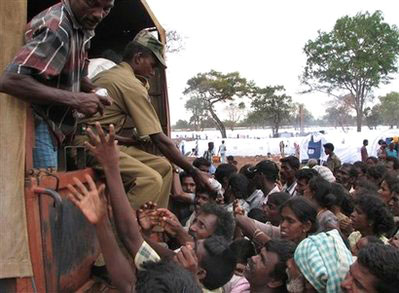As Sri Lanka declared victory over the Liberation Tigers of Tamil Eelam (LTTE) after 25 years of fighting, a quarter of a million people are left suffering and need urgent help for "healing and hope of a future," according to a World Vision aid expert.
Army commander Lt-Gen. Sarath Fonseka said on Monday that troops had finished the task President Mahinda Rajapaksa gave them three years ago.
"We have liberated the entire country by completely liberating the north from the terrorists. We have gained full control of LTTE-held areas," Fonseka announced.
Tamil Tigers Chief Velupillai Prabhakaran has reportedly been shot dead.
The United Nations estimates 7,000 civilians were killed and 16,700 wounded in the fighting over the last five months. Also, about 250,000 people are in need of aid in the north.
That leaves a quarter of million people facing a bleak future if aid does not reach them soon.
World Vision hopes that it will be able to assist those in camps with water, food, shelter, non-food relief items as well as nutrition, education and psychosocial programs for children, and suggested strategies to help the war victims.
"The conventional war may be over but the real challenge now is to foster an environment where fractured and displaced Tamil communities can heal and have a real chance at creating a future for themselves and their children," said aid agency director Suresh Bartlett, of World Vision in Sri Lanka.
There are four issues, Bartlett says, that must be tackled to put Sri Lanka’s children on the road to recovery. Among the 250,000 in displaced camps, an estimated 80,000 are children.
Firstly, people must get back to their original land and homes as quickly as possible and then be provided with the support they need to get back to work.
"These people have been displaced numerous times and in reality the camps are yet another displacement, albeit one where they are safe and having their basic needs met. It is important to get people home as quickly as possible so they can feel a sense of ownership over their own lives, recover their dignity and livelihoods and create an environment where their children feel safe," Bartlett emphasized.
Secondly, special support must be provided for children that addresses their physical, psychosocial, emotional and educational needs. Tens of thousands of children have been severely impacted, having endured months of extremely violent close quarter conflict, a lack of health care, and poor access to shelter and food. Aid agencies and government ministries need to identify children who have suffered trauma and distress and find creative solutions to address the problem.
Thirdly, initiating trust building programs are essential to create an environment of peace. Many Tamils who come from the area once controlled by the LTTE may never have had Sinhalese neighbors or friends. Likewise, those from the south may be suspicious of northern Tamils. A large percentage of those from Colombo or the South have never been to the conflicted North.
Bartlett urged, “We need trust-building programs to break down years of prejudice. It is especially important to focus on the next generation – the children – to give them the opportunities to meet and get to know each other. We would advocate for trust-building programs that bring Tamil and Sinhala communities together, especially those who once lived along what was the Line of Control that divided the country.”
Lastly, millions of aid dollars are needed to fund the return, recovery and rehabilitation phases. None of these programs are possible without the commitment of the international community to support recovery efforts. But without this support the country may not be able to make real progress at achieving peace.
“It is important that donor nations look beyond the financial crisis and the politics of giving or not giving to Sri Lanka and think instead of the tens of thousands of children who will miss out if we don’t help rebuild their families’ lives and meet the specific needs of children themselves," Bartlett underscored. "We have already lost the futures of two generations of children to nearly three decades of war. This must not be allowed to continue."















